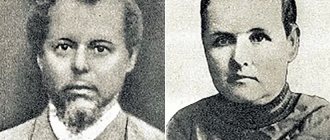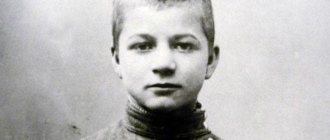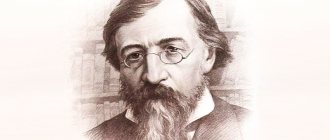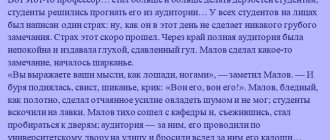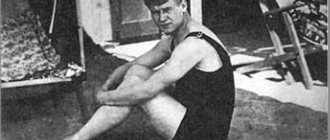Fyodor Tyutchev is a famous Russian lyricist, poet-thinker, diplomat, conservative publicist, corresponding member of the St. Petersburg Academy of Sciences since 1857, privy councilor.
Tyutchev wrote his works mainly in the direction of romanticism and pantheism. His poems are very popular both in Russia and throughout the world.
There are many interesting facts in Tyutchev's biography. We will tell you about all of them right now.
So, here is a short biography of Fyodor Tyutchev .
Brief information
Fyodor Ivanovich Tyutchev is a Russian poet and thinker of the 19th century, a literary classic of his era, corresponding member of the Imperial St. Petersburg Academy of Sciences, diplomat and publicist. Over the entire period, the prolific lyricist wrote about 500 poems, most of which he dedicated to his homeland. However, the main place in his work is occupied by love lyrics.
- Last name, first name, patronymic: Fedor Ivanovich Tyutchev.
- Years of life: 1803-1873.
- Date of birth: Born on the 23rd of November according to the old style.
- Date of death: died July 15 according to the old calendar.
- Death: died at the age of 69, in Tsarskoye Selo due to a stroke, buried in St. Petersburg, at the Novodevichy cemetery.
- In what century did Tyutchev live: XIV century.
- Place of birth: Ovstug estate, Oryol province (modern Bryansk region).
- Parents: father - Ivan Nikolaevich Tyutchev, mother - Ekaterina Lvovna, nee Tolstaya.
Link to article: personality characteristics of F.I. Tyutchev. Link to article: 14 interesting facts from the life of F.I. Tyutchev.
Who was the first biographer of F.I. Tyutchev?
The first biographer of F.I. Tyutchev, his son-in-law Ivan Aksakov.
Who was F. Tyutchev's teacher?
The first teacher and mentor was the poet S.E. Raich.
F. Tyutchev, poet or writer?
He was a poet-thinker.
Early years
Young Fedya's parents were of a noble family, so they raised their son accordingly. The future poet received an excellent education at home; by the age of 13 he was well versed in ancient Roman poetry. The boy also knew Latin and could translate the poetry of Horace. His home teacher was the poet and translator S.E. Raich.
At the age of 15, the young man began attending lectures on literature, which took place at Moscow University. He became a student at this educational institution. A year later, Tyutchev was enrolled in the Society of Lovers of Russian Literature.
In 1821, Fedor graduated from the university and went to work at the College of Foreign Affairs. After some time, he had to move to Munich as a diplomat. The poet spent 22 years abroad, where he managed to start a family with Eleanor Peterson. The woman was the greatest love of his life, they had three daughters.
In addition, while working in Munich, Fyodor Ivanovich became interested in German idealist philosophy. He repeatedly communicated with Friedrich Schelling and became friends with Heinrich Heine. It was Tyutchev who became the first translator of his works into Russian.
Childhood, youth and education
Fyodor Tyutchev comes from an ancient noble family, descended from an Italian with Tatar roots. According to one version of biographers, the surname of the founder - Dudzhi - in Russian was transformed into “Tutche”, as a result it was transformed into the Russified “Tyutchev”. According to another theory, the origin of the surname is Uyghur, from the word “tutaci”.
The future poet was born on a family estate, in the village of Ovstug, Oryol province, Bryansk district. His birthday fell on November 23, 1803. Fyodor was not the only child in the family: Fyodor had an older brother, Nikolai, and a younger sister, Daria. Fedor's parents preferred that their children receive primary education at home. As a result, the younger Tyutchevs learned the basics of literacy under the guidance of Nikolai Khlopov, a former serf, their first teacher.
Fyodor Tyutchev’s childhood, like his youth, took place both in Ovstug and in Moscow; it was there that the family acquired a large house. Later, during the occupation by French troops, in the family estate near Yaroslavl.
Young Fedor received his first systematic education under the guidance of Semyon Raich. The teacher was a talented teacher of his time, who instilled in him a love of literature and foreign languages. It was thanks to Raic’s upbringing that the future poet became familiar with the treasures of world literature. As a result, the further work of Fyodor Tyutchev was determined. By the age of 12, Fyodor had already translated Horace, and his work is still considered exemplary.
Fyodor Tyutchev graduated from Moscow University in 1821. Even then, Fedor was a member of the society of lovers of Russian literature and a literary protégé of Alexei Merzlyakov. At that time, A. Merzlyakov influenced all Russian literature of that time.
What could Botkin not save the author of “I Met You...” from? The story of Fyodor Tyutchev
He was clumsy and absent-minded, but everyone instantly fell silent when he began to speak. Fyodor Ivanovich himself had an unflattering opinion about his own poems and refused to take part in both lifetime editions of his works. He simply wrote because he could not help but write. And he did not care about the further fate of the poems.
“When I write,” Tyutchev said, “I never say what I would like or how I would like it. This is what inspires me with an immense disgust for writing.”
The poet's inner world was much more complex and multifaceted than what was reflected on paper. Tyutchev experienced his life as a novel, and built it according to the latter.
One of his greatest weaknesses was his worship of female beauty. At the same time, everyone he loved was doomed to suffering and loneliness. Tyutchev was tailored according to such drawings - the highest masterpieces of his poetry were born in moments of life's tragedies.
Fedya Tyutchev first discovered his amazing gift for turning tragedy into poetry in childhood, at the age of six. This happened in 1809 on the family estate of Ovstug, Bryansk province. While walking in a grove near the cemetery, an impressionable boy found a dead turtle dove. He buried the bird and grieved for it so sincerely that he even composed an epitaph in verse.
The child’s poetic talent was noticed by Fyodor’s home teacher. With his blessing, at the beginning of 1818, a fourteen-year-old teenager was accepted into the club of lovers of Russian literature. A year later, Tyutchev’s poems would be published for the first time, and a few months later the boy would be accepted into the literature department of Moscow University.
In 1821, on his eighteenth birthday, Fyodor Tyutchev completed his studies at the university.
He will go down in history not only as a poet, but also as one of the first geopoliticians of Russia. Possessing an amazing gift of foresight, Tyutchev was the first to predict the collapse of the Austrian Empire, the inevitability of the Crimean War, and the Paris Commune. He could have become an outstanding publicist of our time, but nothing could compare with the variability of his moods.
The last ten years of his life became especially difficult for the poet. In August 1864, in Tyutchev’s arms, his last love, Elena Aleksandrovna Denisyeva, died of consumption. Later critics would call Tyutchev’s cycle of poems dedicated to Denisyeva the first lyrical novel in Russian literature.
After Elena’s death, Fyodor Ivanovich will bury their joint daughter and son. Then the poet's mother will leave. After that - the eldest son, brother and youngest daughter. Tyutchev experienced the last two tragedies, already suffering greatly from gout and suffering from a debilitating headache.
He will outlive Denisyeva by nine years. At the end of his life, he accidentally meets Amalia Krudener, his first love, and dedicates brilliant lines to her: “I met you - and all the past...”.
What did Tyutchev come to the end of his life with? His career did not work out; his recognition as a poet did not give him happiness. On one of his sorrowful days, Tyutchev admits that he has lost the slightest faith in his rebirth.
The poet's first symptoms of a fatal illness appeared in 1872. At first, his left hand began to work poorly, at the same time his vision deteriorated, his headaches intensified, and insomnia began to overcome him. After a while he will feel better, but soon he will have an attack. This will happen after he submits his new poem “Napoleon” to the magazine “Citizen”. The poet will return from the editorial office in a state of strong nervous excitement. Biographers suggest that the reason was some unpleasant conversation for the poet.
On December 31, 1872, Tyutchev celebrated the New Year at the house of friends, and on the first day of the new year, 1873, he was taken from a walk unconscious, with a twisted mouth and complete paralysis of the left half of the body.
Professor Sergei Petrovich Botkin, called to treat Tyutchev, set up a 24-hour medical post near the patient. The doctor examined the poet daily and even kept a diary of observations of his condition. The symptoms observed in Tyutchev allowed the great therapist to diagnose the poet with a stroke. Signs of a stroke include impaired movement of facial muscles - when a person smiles, one of the corners of his mouth may droop. Other symptoms include: Restriction of movement in an arm or leg. Very often, with a stroke, there is a violation of articulation - patients cannot pronounce some words. The therapeutic window from the moment of development of the first symptoms of stroke is 4.5 hours. It is much easier for modern doctors to differentiate between hemorrhagic and ischemic strokes in order to prescribe the correct treatment than for their predecessors. For this purpose, magnetic resonance imaging of the brain is performed. Professor Botkin did not have such an opportunity.
However, the treatment prescribed by the professor had an effect. Tyutchev came to his senses and began to recover. However, on June 11, 1873, he suffered a second stroke.
Tyutchev died on July 15, 1873.
He spent his whole life searching for the ideal of love and women, but he only managed to get closer to it in poems that have survived to this day and have not lost their poignancy.
Career of a diplomat abroad 1821-1843
After receiving the certificate, Fyodor Tyutchev began his career in the public service. He entered the College of Foreign Affairs and, as a freelance attaché of the Russian diplomatic mission, went abroad to Munich.
Those years The biography of Fyodor Tyutchev is closely connected with Germany, in which the poet lived for many years. As a result, the period of living abroad for 20 years was the most fruitful for the lyricist. First of all, this period had a decisive influence on the choice of themes for his further work.
Friendship with Schelling and Heine, whose poems he first opened for the Russian public, inspired Fyodor Tyutchev to create romantic lyrics, which were deep and spiritual. His works of that period are permeated with idealistic philosophy, in accordance with the spirit of the era and the intellectual mood of the country. It was romanticism that originated as a movement in aesthetics. In the poems, Fyodor Ivanovich, one can feel the influence of Schiller pantheism, as well as odic Russian lyrics of the last century.
The poet also pays great attention to the political problems of his country. This can be seen in the work dedicated to the Decembrists, “December 14, 1825,” where Tyutchev speaks of the obvious doom of the uprising. The poem became a kind of milestone for Fyodor Tyutchev. Subsequently, thoughts about the fate of Russia in life will occupy him more and more.
Tyutchev's literary debut as a poet occurred relatively late: in 1836, when A. S. Pushkin published a selection of his poems in the Sovremennik magazine. However, recognition came to the poet only after his death.
In 1835, Fyodor Tyutchev was granted the title of chamberlain. However, after 4 years his diplomatic mission was over, but the poet lived abroad until 1844, on behalf of A.H. Benckendorff, working to create a positive image of Russia in Europe.
Tyutchev's creativity
While in Germany, Tyutchev, as before, studies poetry and is also interested in German philosophy. In parallel with this, he translates the works of Goethe and Schiller into Russian.
In addition, he continues to write poetry, which he later publishes in Russian publications.
During the period of biography 1820-1830. he wrote such poems as “Spring Thunderstorm”, “Like the Ocean Envelops the Globe...”, “Fountain”, “Winter is not angry for nothing...” and others.
In 1836, the Sovremennik magazine published 16 works by Tyutchev under the general title “Poems sent from Germany.”
Thanks to this, Fyodor Tyutchev is gaining great popularity in his homeland and abroad.
At the age of 45, he receives the position of senior censor. At this time, the lyricist continues to write poetry, which arouses great interest in society.
Nekrasov and Fet called Tyutchev one of the most talented poets of our time.
Life in Russia since 1844
After returning home in 1844, Fyodor Tyutchev continued to work in the Ministry of Foreign Affairs, and in 1848 he received the position of senior censor. Since 1857, he headed the St. Petersburg Censorship Committee, which was responsible for all foreign literature. At the same time, Fedor became an official of the 4th rank and an actual state councilor.
During this period, the figure moved away from poetry and devoted most of his time to journalism, as well as actively working in the circle of V. G. Belinsky. Other members of the circle also belonged to the Russian literary elite, namely: Ivan Turgenev, Nikolai Nekrasov, Ivan Goncharov.
Fyodor almost never published poems, but he wrote many articles in French devoted to contemporary problems. Among his famous works are “Letter to Mr. Dr. Kolb” (1844), “Note to the Tsar” (1845), “Russia and the Revolution” (1849), “The Papacy and the Roman Question” (1850).
The last two articles relate to the treatise “Russia and the West,” which Fyodor Tyutchev conceived under the impression of the revolutions that rocked Europe in 1848-1849. In his work, the publicist tries to recreate the original image of Russia, namely its “Orthodox character.” Fedor reflects on the peculiarities of the country's imperial structure, appealing to the centuries-old traditions of autocracy.
In 1857, simultaneously with his appointment as head of the censorship committee, Fyodor Tyutchev published an article “On Censorship in Russia.” In the work, he shared his thoughts on the relationship between politics and publishing.
Later, in correspondence with the then head of the Ministry of Foreign Affairs, friend and like-minded Prince A. Gorchakov, the publicist introduced him to his political considerations, which were close to the postulates of the Slavophiles. And also, Fedor pointed out the originality of the Russian path and the peculiarity of the development of Russia. Including its uniqueness in comparison with any European countries.
The poet's poems during this period reflect his political views. These poems are the ones most often cited to this day by his famous works “Russia cannot be understood with the mind...” and “Slavs”.
In 1865, Fyodor Ivanovich completed his service and retired with the rank of Privy Councilor. In total, Fyodor Tyutchev served as head of the censorship committee for more than 15 years, and worked until his death. During his service, the poet, despite friction with the government, received many awards.
Politics and poetry have always occupied equal places in the work of the Russian publicist. Despite his idealistic mood, his lyrics did not lose their relevance. Thanks to his deep understanding of the problems of modern society and the special fate of Russia, Tyutchev was made a leading thinker of his time.
A very short biography of Tyutchev for children 4th grade
The writer was born on November 23, 1803 in the Oryol province. The family was noble.
Tyutchev had his favorite teacher-mentor Yegor Ranch, who helped him in everything and raised more parents. Already at the age of twelve, with the help of his teacher, Fyodor Ivanovich wrote his first poems. At the age of fifteen, not needing a teacher, he began to study at the institute in the literature department. After graduating from college, he went to work abroad for almost 20 years. Where he worked as a diplomat in Italy and Germany.
All this time he was not engaged in literary activity. Upon returning home, he began working in the Foreign Affairs Committee. Pushkin saw his first poems in 1836 and helped them publish them in many magazines. After which he went out into the world. The first assembly of Fedor appeared in 1854. Tyutchev has many famous poems such as: “Russia cannot be understood with the mind”, “winter does not last long”, “evening”, “flowing sand up to the knees”.
Tyutchev did not become a writer and worked in a different field; children still learn his poems at school. His creations are often flawless.
Fyodor Tyutchev died in July 1879 in the village of Tsarskoye. He never began a career in literature.
4th grade. 6th grade.. 3rd, 10th grade. for children
Biography by dates and interesting facts. The most important.
last years of life
In recent years, Fyodor Tyutchev retired from active social activities, and family troubles were to blame for this. At that time, a series of deaths among loved ones led the poet into a depressed state of mind. His last poems were dedicated to his lost lover, and in letters to friends he thought a lot about approaching old age and death.
Since December 1872, the poet had been ill a lot and was partially paralyzed: he had no use of his left hand, his vision had noticeably deteriorated, and he also suffered from prolonged headaches. Due to loss of vision, he was forced to dictate his works to a secretary. As a result, the lyrics of this period are distinguished by piercing tragedy. The characteristic mood is deeply expressed in Tyutchev’s famous poems “Insomnia” (“At night in the city desert...”) and “The executing God took everything from me...”.
Despite exhaustion, Fyodor Tyutchev sought to return to active work. He was keenly interested in the political situation in Europe and followed the progress of the Franco-Prussian War. Fedor tried to stay up to date with global news: he subscribed to newspapers and discussed a lot with his friends the events unfolding in the political arena.
Interesting Facts
- Tyutchev was a very amorous person. In his life there was a relationship with Countess Amalia, then his marriage to E. Peterson. After her death, Ernestina Dernberg became Tyutchev's second wife. But he also cheated on her for 14 years with another lover, Elena Denisyeva.
- The poet dedicated poems to all his beloved women.
- In total, the poet had 9 children from different marriages.
- Remaining in public service all his life, Fyodor Ivanovich Tyutchev never became a professional writer.
- Tyutchev dedicated two poems to Alexander Pushkin: “To Pushkin’s Ode to Liberty” and “January 29, 1837.”
Previous
Biographies Milton Berle (Milton Berle) short biography
Next
Biographies Alessandro Algardi (Alessandro Algardi) brief biography of the sculptor
Death of a famous person
At the beginning of January 1873, a second apoplexy followed, due to which Fyodor Ivanovich lost the ability to move freely, namely, the entire left half of his body was paralyzed. On July 15, 1873, at the age of 69, Tyutchev died in Tsarskoe Selo. The coffin with the poet's body was transported to St. Petersburg. F.I. Tyutchev was buried at the Novodevichy cemetery. Tyutchev’s daughter, son and son-in-law also now rest in the family grave: their tombstones are made in the characteristic style of the Ruggia and Maderni workshops.
The death of Fyodor Tyutchev shook up Russian literature. From a young age to an old age, he served the country faithfully, but his work remained underestimated. And this service was not limited only to government activities. All of the lyricist’s work is dedicated to Russia, its primary and original value, the spiritual center of his works.
F.I. Tyutchev denied the possibility of intellectual comprehension of the Russian soul. For him, the Motherland was an object of faith, religious and moral perception, namely an intuitively perceived concept that was not subject to analysis. The poet's latest collections of poems were not in demand among his contemporaries. However, after his death, Tyutchev became one of the recognized classics of Russian literature.
Return to Russian lands
In 1837, Fedor was appointed first secretary of the Russian mission in Turin. His wife dies there. She could not stand the constant betrayal on the part of her husband, in addition, Eleanor often complained about her health. In 1839, the poet married his mistress; for the sake of the wedding, he left for Switzerland without the consent of his superiors.
Because of this, Tyutchev’s career as a diplomat ended. For the next five years he lived in Munich without official status while trying to regain his position. Fedor was unable to do this, so he had to go back to Russia. Since 1848, Fyodor Ivanovich became senior censor in the Ministry of Foreign Affairs. At the same time, he does not stop writing and participates in Belinsky’s circle. The poet constantly communicated with creative people. Among them were such writers as Ivan Turgenev, Nikolai Nekrasov, Ivan Goncharov and others.
In the 50s, the next stage in Tyutchev's poetry began. At this time, he wrote mainly on political topics, but did not publish his poems. From 1843 to 1850, Fedor spoke with political articles about the utopian future of the “all-Slavic empire” and the inevitable collision of Russia with the whole world. In 1858, the poet became chairman of the Foreign Censorship Committee. It is noteworthy that he repeatedly defended the persecuted publications.
In 1848-1850 the writer creates several beautiful poems, completely immersed in political themes. These include such poetry as “To a Russian Woman,” “Reluctantly and timidly...” and “When in a circle of murderous worries...”.
The year 1864 became a turning point in the poet’s life. First, his beloved Elena Denisyeva dies of consumption, and a year later their children together die. The decisive blow was the death of Fedor's mother. The published collection did not gain popularity; difficult times came in Fedor’s life. Due to numerous problems, his health deteriorated significantly. On July 15, 1873, the poet died in Tsarskoye Selo. He was buried at the Novodevichy cemetery in St. Petersburg.
Until the end of his life, the poet remained in public service, never becoming a professional writer. His last years were marked by the writing of political poems. Among them are the works “When the Decrepit Forces ...” and “To the Slavs”.
Personal life, women, children
Briefly described, Tyutchev’s personal life was extremely eventful, but rarely prosperous. His muses were 5 women, including simpletons and beauties of the big world:
- Ekaterina Kruglikova;
- Amalia von Lerchenfeld;
- Eleanor Peterson;
- Ernestina Dernberg;
- Elena Deniseva.
Tyutchev’s family had many children from several marriages, but some died at a young age, which caused the poet’s deep mental pain.
First love - Ekaterina Kruglikova
The courtyard girl Katerina Kruglikova was the first youthful hobby that Fyodor Tyutchev nurtured during his university years. Unfortunately, everything was destined for Fedor’s status. The rash relationship met with sharp disapproval from the poet’s parents, who insisted on his moving to St. Petersburg in order to stop the unwanted relationship. Catherine herself was provided with a dowry and married off. Kruglikova is the only lady of the poet’s heart to whom he did not devote a single poem.
Next love - Amalia von Lerchenfeld
At the dawn of his diplomatic career, while living in Munich, 18-year-old Tyutchev met Amalia Lerchenfeld. The girl was the illegitimate daughter of the Prussian king. Amalia was one of the first beauties of Germany at that time, and the young poet had great love for her. Amalia became the inspiration for the romantic and aesthetically delightful poem “Your sweet gaze, full of innocent passion...”.
A couple of years later, Fyodor Tyutchev almost became a participant in a duel because of her. He had to temporarily return to Russia to hush up the scandal. The poet’s later famous poem “I Met You and All the Past”, which formed the basis of the romance, is dedicated to Amalia.
Amalia Lerchenfeld sought to make a suitable match and did not consider the poor Russian nobleman as a potential husband. The relationship fell apart.
First wife Eleanor Peterson and the birth of daughters Anna, Daria and Ekaterina
The first of two legal spouses and Tyutchev’s new love, Eleanor Peterson, née Countess Bothmer, became the poet’s companion immediately after returning to Germany. In 1826, Tyutchev married Eleanor, and it was a happy marriage for both. From Peterson, Fyodor Ivanovich had three children: daughters Anna, Daria and Ekaterina.
After 12 years of family happiness, Eleanor Tyutcheva died, leaving her husband Fyodor a widower. The poet’s grief was so great that they claim that he turned gray in a matter of hours when he spent the night sitting at his wife’s coffin.
Second wife Ernestina Dernberg and the birth of children Maria, Dmitry, Ivan
Ernestine von Pfeffel, married to Dernberg, became Tyutchev’s lover and comforter during a period of painful experiences. The relationship began when the poet was still married to Eleanor. She knew about her husband’s affair on the side and demanded its end, but the lovers were united not only by sensual, but also by spiritual intimacy. Tyutchev could not break off the relationship, despite promises.
Fyodor Ivanovich and Ernestina got married immediately after the end of official mourning. The poet also had children from his second wife: sons Dmitry and Ivan, as well as daughter Maria.
Beloved Elena Denisyeva and the birth of children Elena, Nikolai and Fedor
Elena Denisyeva, a student of the institution where Tyutchev’s daughters were educated, became the poet’s last woman. With her, Fyodor Ivanovich created a second family, without divorcing his wife Ernestina. The most tragic and most touching poems, united by researchers of his work in the “Denisevsky cycle,” are dedicated to Elena. The birth of three children and constant bullying in society undermined Elena’s health. The woman died of consumption in Tyutchev’s arms before she even reached the age of 40.
A difficult fate did not prevent Fyodor Tyutchev from becoming a poet and publicist. Including a thinker and statesman, the story of which occupies a prominent place in the history of Russian literature and philosophy of the 19th century.
Personal life of Tyutchev
By nature, Fyodor Tyutchev was a man of many lovers. Over the years of his biography, he had close relationships with different women, which he himself never hid.
His first chosen one was Amalia Lerchenfeld, who was the illegitimate daughter of the Prussian monarch Friedrich Wilhelm III.
An interesting fact is that at the time they met, the girl was barely 14 years old. No less interesting is the fact that Alexander Pushkin himself admired Amalia’s beauty.
Amalia Lerchenfeld
However, the relationship between Tyutchev and Lerchenfeld never reached the wedding. The girl chose to marry the wealthy Baron Krudner.
The first wife in Tyutchev’s biography was Eleonora Fedorovna. In this marriage they had 3 daughters: Anna, Daria and Ekaterina.
It is worth noting that Tyutchev had little interest in family life. Instead, he liked to spend his free time in noisy companies in the company of representatives of the fairer sex.
Soon, at one of the social events, Tyutchev met Baroness Ernestina von Pfeffel. An affair began between them, which everyone immediately found out about.
When the poet's wife heard about this, she, unable to bear the shame, struck herself in the chest with a dagger. Fortunately, there was only a minor injury.
Tyutchev's first wife Eleanor (left) and his second wife Ernestine von Pfeffel (right)
Despite the incident and condemnation in society, Fyodor Ivanovich was never able to part with the baroness.
After the death of his wife, he immediately married Pfeffel.
However, having married the baroness, Tyutchev immediately began to cheat on her. For many years he had a close relationship with Elena Deniseva, whom we have already mentioned.
